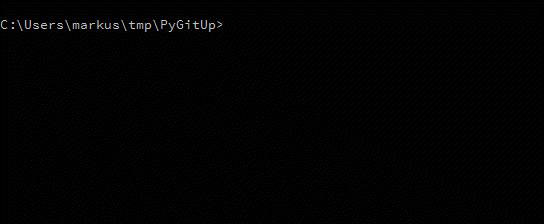PyGitUp is a Python implementation of the great
aanand/git-up/. It not only
fully covers the abilities of git-up and should be a drop-in replacement,
but also extends it slightly.
git pull has two problems:
- It merges upstream changes by default, when it's really more polite to rebase over them, unless your collaborators enjoy a commit graph that looks like bedhead.
- It only updates the branch you're currently on, which means git push will shout at you for being behind on branches you don't particularly care about right now.
I wasn't able to use the original git-up, because I didn't want to install
a whole Ruby suite just for git-up and even with Ruby installed, there were
some problems running on my Windows machine. So, my reasons for writing
and using this port are:
- Windows support.
- Written in Python ;)
- Run
$ pip install git-up cdto your project's directory.- Run
git upand enjoy!
You need pip installed and working. Check out
SO#4750806 for more
information. And don't forget to either:
- make your
Python/ScriptsandPython/Lib/site-packageswritable for you, - run
pipwith admin privileges - or use
pip install --user git-upand add%APPDATA%/Python/Scriptsto%PATH%.
Otherwise pip won't install due to Access denied errors.
PyGitUp is not compatible with Python 3 because some essential 3rd party
libs don't support it. Sorry.
git up -hshows a help message.git up --quietsuppresses all output except for error messages.git up --versionshows the current version and optionally checks for updates (see below).
To configure PyGitUp, you can set options in your git config. Run
git config [--global] git-up.[name] [value] to set one of these
options:
git-up.bundler.check [true|*false*]: If set totrue,PyGitUpwill check your app for any new bundled gems and suggest abundle installif necessary.git-up.bundler.autoinstall [true|*false*]: If set totrue,PyGitUpwill runbundle installautomatically. Requiresgit-up.bundler.checkto be true.git-up.bundler.local [true|*false*]: If you'vebundle package-ed your project gems, you can tellPyGitUpto runbundle install --localfor you if it finds missing gems. Much faster than just a plain oldbundle install. Don't worry if you're missing gems, it will backtrack tobundle installif anything goes wrong. Make suregit-up.bundler.autoinstallis also set totrueor it won't do anything.git-up.bundler.rbenv [true|*false*]: If you have rbenv installed, you can tellPyGitUpto runrbenv rehashfor you after it installs your gems so any binaries will be available right away. Make suregit-up .bundler.autoinstallis also set totrueor it won't do anything.git-up.fetch.prune [*true*|false]: If set totrue,PyGitUpwill append the--pruneoption togit fetchand thus remove any remote tracking branches which no longer exist on the remote (see git fetch --help).git-up.fetch.all [true|*false*]: If set tofalse,PyGitUpwill only fetch remotes for which there is at least one local tracking branch. Setting this option will makegit upalways fetch from all remotes, which is useful if e.g. you use a remote to push to your CI system but never check those branches out.git-up.rebase.arguments [string]: If set,PyGitUpwill use this string as additional arguments when callinggit rebase. Example:--preserve-mergesto recreate merge commits in the rebased branch.git-up.rebase.auto [*true*|false]: If set tofalse,PyGitUpwon't rebase your branches for you but notify you that they diverged. This can be useful if you have a lot of in-progress work that you don't want to deal with at once, but still want to update other branches.git-up.rebase.log-hook [cmd]: Runscmdevery time a branch is rebased or fast-forwarded, with the old head as$1and the new head as$2. This can be used to view logs or diffs of incoming changes. Example: 'echo "changes on $1:"; git log --oneline --decorate $1..$2'
git-up.updates.check [*true*|false]: When runninggit up --version, it shows the version number and checks for updates. If you feel uncomfortable with it, just set it tofalseto turn off the checks.
The original git-up has been written by aanand:
aanand/git-up/.
- 3rd party dependencies have been updated to fix a problem with a 3rd party library (#18)
- Fixed some typos in README and
PyGitUpoutput. - 3rd party dependencies have been updated.
ahead of upstreammessages are now cyan (see aanand/git-up#60)- Fixed problem when using % in the log hook (#11)
- Fixed problems with the dependency declaration.
- Fix for #7 (AttributeError: 'GitUp' object has no attribute 'git') introduced by v1.1.0.
Prior to v1.1.0,
PyGitUptried to guess the upstream branch for a local branch by looking for a branch on any remote with the same name. With v1.1.0,PyGitUpstops guessing and uses the upstream branch config instead.This by the way fixes issue #6 (
git updoesn't work with local only branches).Note: This change may break setups, where a local branch accidently has the same name as a remote branch without any tracking information set. Prior to v1.1.0,
git upwould still fetch and rebase from the remote branch. If you run into troubles with such a setup, setting tracking information usinggit branch -u <remote>/<remote branch> <local branch>should help.3rd party dependencies have been updated.
Allows to run
git up --versionfrom non-git dirs, too.
Finally PyGitUp reaches 1.0.0. You can consider it stable now :)
- Added a comprehensive test suite, now with a coverage of about 90%.
- Lots of code cleanup.
- Added option
-hto display a help screen (--helpwon't work, becausegitcatches this option and handles it beforePyGitUpcan do). - Added option
--versionto show, what version ofPyGitUpis running. Also checks for updates (can be disabled, see configuration). - Added option
--quietto be quiet and only display error messages.
- Fixed issue #4 (ugly exception if remote branch has been deleted).
- Fixed issue #3 (didn't return to previous branch).
- Fixed problem: check-bundler.rb has not been installed when installing via PyPI (problems with setup.py).
- Incorporated aanand/git-up#41: Support for
bundle install --localandrbenv rehash. - Fixed issue #1 (strange output buffering when having multiple remotes to fetch from).
- Some under-the-hood improvements.
- Initial Release



